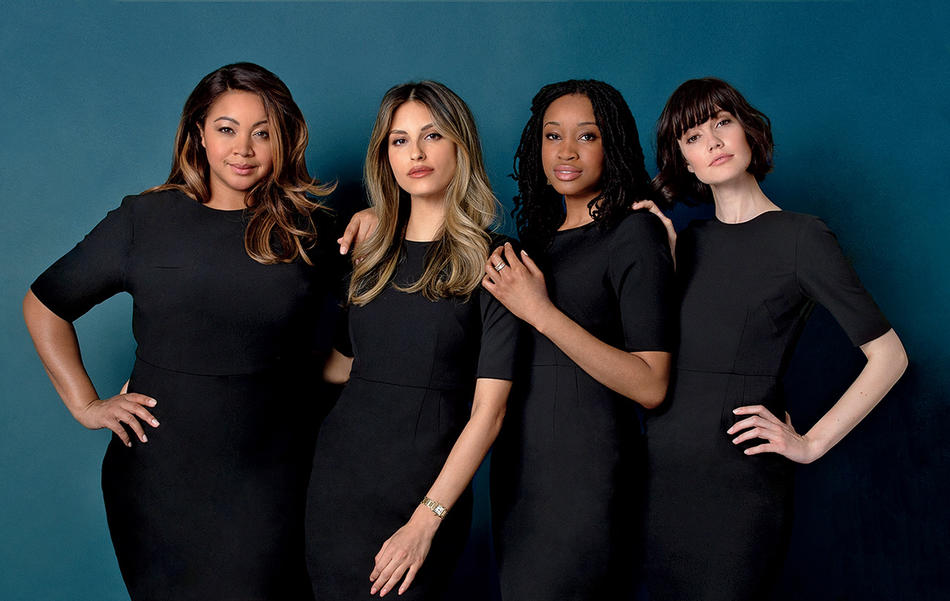In 2015, Carly Bigi ’17BUS, then a young consultant at Deloitte, went shopping for clothes with a male friend. Bigi spent most of the day shuttling between stores and trying on different outfits, none of which really fit, but she watched in awe as her friend went to a single shop and quickly bought clothes tailored to his body.
“The difference was shocking,” she says. “Men’s clothes are all based on measurements — collar size, inseam length, etc. Whereas women often have to guess where they land on a mysterious and pretty arbitrary numerical sizing scale.”
Bigi has always considered herself a problem-solver. Growing up in Houston as the daughter of two NASA scientists, she was raised to think critically about the world around her and to come up with practical solutions when needed. So when it came to women’s clothing, she used the same skill set she’d relied on since she was a child — math, science, and a lot of research — to try to develop a better system.
The result is Bigi’s direct-to-consumer fashion line, Laws of Motion, which uses data science and a proprietary algorithm to provide customers with 144 “microsizes” that fall between the traditional sizes 00 and 24. Customers answer a short “fit quiz” that takes into account attributes like torso length, waist circumference, and bust size in addition to height, weight, age, and other factors.
“Women carry volume differently on their bodies,” Bigi says. “Almost no one is a perfect size two or twenty-two. Statistically, we found that traditional sizing only really fits 2 to 5 percent of the population.”
Bigi had already been accepted into Columbia Business School when she started thinking seriously about developing Laws of Motion. She had planned to return to Deloitte after graduation, but once she had immersed herself in Columbia’s entrepreneurship curriculum, she decided to pursue her idea full-time.
Bigi graduated in 2017, wearing Laws of Motion’s newly developed Alpha dress — a classic knee-length, short-sleeved shift — under her traditional blue robe, and claimed a spot at the Columbia Startup Lab. That summer, she focused on fundraising, bringing in over a million dollars in her first round. And over the next two years, she built her team strategically, taking the unusual step for a fashion company of bringing on two data scientists as her first two hires. And she conducted extensive customer research, trying to figure out how women shopped and what features were important to them.
Bigi at Columbia commencement in 2017:
Based on what she learned, Bigi tried to create a product that addressed all her customers’ concerns — down to the smallest details. For example, Laws of Motion’s garments are machine-washable. The dresses have zippers with extra-long pulls, to make it easy for women to reach them, and they have sturdy reinforced pockets.
It was also important to Bigi that Laws of Motion practice sustainable, zero-waste manufacturing. After a customer orders an item, the clothing is custom-cut digitally, which takes about ten minutes. “Because we make everything to order, we don’t have a warehouse full of inventory sitting around,” Bigi says. “Our return rate is also significantly lower than that of companies that use traditional sizing, so we’ve been able to essentially eliminate fabric waste.”
Laws of Motion officially launched in May 2019, starting with a single basic dress, the Alpha. (“It’s honestly appropriate for every occasion, from work to a date,” Bigi says. “I would wear it every single day.”) The response was overwhelming — Laws of Motion has been featured on the Today show and Good Morning America and was named to Time magazine’s list of the best inventions of 2019. The company has now added a second dress as well as a blazer; all come in several colors, and they’re designed to work together.
“Fashion may sound frivolous to some, but research has found that having a garment that fits well can make an enormous difference in terms of confidence in the workplace,” Bigi says. “Women have made strides in asking for equal pay and equal opportunities. I see this as a small but vital piece in the puzzle.”
Since the COVID-19 outbreak began, Laws of Motion has taken on another role: it has temporarily pivoted all production at its New York factory to make masks and gowns for local hospitals. Additionally, it developed one new product — a silky bathrobe perfect for lounging at home while on lockdown. The profits from the robe will help fund its efforts to provide medical supplies to first responders.
“It’s a scary time, but morale on our team has never been higher,” Bigi says. “We are focused on doing what we can to help the world get through this.”
This article appears in the Spring/Summer 2020 print edition of Columbia Magazine with the title "One Size That Fits You."



